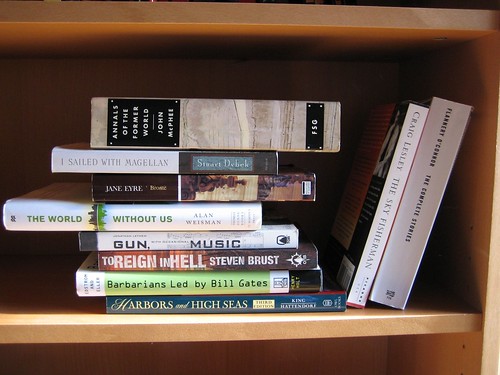I’m not a terribly decisive person, as anyone who can remember movie reviews here, which used a scale from 1-10 in half increments can attest. Thus it should surprise no one that I had a tie for “favorite book” of 2008, between The Blind Assassin by Margaret Atwood and Virginia Woolf’s Mrs. Dalloway. I rather like the two-spot system. It allows me to be indecisive, and after all, rating books is so vicious. Reviewing them is hard enough — rather like trying to capture the taste of a fine coffee in words — but rating them is so final and arbitrary. Choosing two is perhaps no less arbitrary than choosing one, but it seems more friendly. And, in theory, two favorites allows me to have variety in my choices (although 2008’s two lushly penned literary novels about characters’ hidden internal lives may not prove that point.)
You may wonder why I am posting 2009’s favorite books in February. But since, as I posted yesterday, I don’t read in a timely fashion, my posting habits should shock no one.
Last year, my two favorites were:
 The Yiddish Policemen’s Union by Michael Chabon.
The Yiddish Policemen’s Union by Michael Chabon.
This is the first thing I’ve read by Michael Chabon, tho’ several of his works are on the list. One of the things I loved about this book is how it started small, acquainting me with the details of the alternate-history setting, and reveling in the synergy of hard-boiled style with Yiddish words and fatalistic humor. Then it opened out, and out, and out.
It works as a murder mystery, and an alternate history. It’s well-paced, beautifully built, and has an ample helping of intrigue and danger. But by the end the stakes are higher, and the meaning greater, than I ever would have guessed from the simple joys of the first few chapters. It had me weeping. The characters, even archetypical Detective Landsman, are vivid and likeable. The writing is witty, if occasionally over the top. It’s just a splendid, unique story.
 The Player of Games by Iain M. Banks.
The Player of Games by Iain M. Banks.
This is the second book I’d read by Iain M. Banks (now I’ve read three) and it really cemented his place in my esteem. It’s a smart, almost virtuosic science fiction novel set in his Culture universe. It’s about societies, the power of culture and language, and yes, games. The writing is very precise, the characters believable even when they are unpleasant. The settings are imaginative — in one case, both giving me my first suspicion that Iain M. Banks is a fellow geology geek, and one of the strongest attacks of sensawunda I can readily recall. (Banks’s work is fairly sensawunda-intensive, I’d say.) Most of all, it is, as I said, smart. The plot, themes and subtext are all honed and working together. It’s as impressive as it is enjoyable.
I was actually rather shocked to realize this book was written in 1988. I didn’t notice anything that dated it at all. I’m pretty sure this book — its layers of meaning and insight, its intricate plot, the mindblowing settings and sense of scale and space — will stick with me for years to come. Thank you to Michael for recommending it to me and Ryan, and to Ryan for buying it and leaving it within easy reach.
Postscript: Man, look at those covers. Different, striking, communicative. I especially love the Banks cover.






